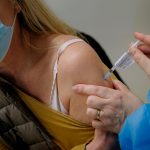Cases of a disease known as “Aleppo boil” have soared in recent months because of a lack of insecticides in northeastern Syria, the Kurdish Red Crescent has said.
Officially known as Leishmaniasis, it is a parasitic disease transmitted through the bites of sand flies.
It causes skin ulcers and a fever, and can lead to an enlarged spleen and liver.
There have been 16,500 reported infections in villages close to the Al Khabour River since the beginning of August.
The stretch of water, which contains open sewage, dried up and turned into a landfill.
In addition there were swamps of stale water, providing an ideal environment for flies.
Shamsa Khalil Alloush, whose son Abed became infected, said the family had “tried every remedy but to no avail”.
Shamima Begum: IS bride insists she ‘didn’t hate Britain’ when she fled to Syria – and now wants to face trial in UK
Syria: 14 killed and at least three injured after explosion destroys bus in Damascus
Vladimir Putin and Syria’s President Assad meet in Moscow for first time since 2015
She added: “We tried different treatments and ointments but they all didn’t work out. We ran out of money as we sold all our sheep and can’t cover treatment expenses anymore.”
Abdul-Ghani Al-Khidr, who lives in Al-Luhima, said at least 80% of residents were infected.
He added: “We expected the municipality to clean and collect the waste that flooded Al Khabour River and formed swamps of stale water.”
Hanouf Shahr Ibrahim, a nurse at a field hospital and a member of the Kurdish Red Crescent, said the disease had only taken hold because of a lack of intervention.
“I believe that we need to radically address the problem by using insecticide,” she said.
“The disease wouldn’t have spread if those insecticides were used at the right beginning.”
She added: “We have repeatedly called upon organisations to provide us with those insecticides.
“Last year, we had almost no cases because they were used, reporting only eight cases. Whereas there are currently 16,500 reported cases since the first of August.”






















